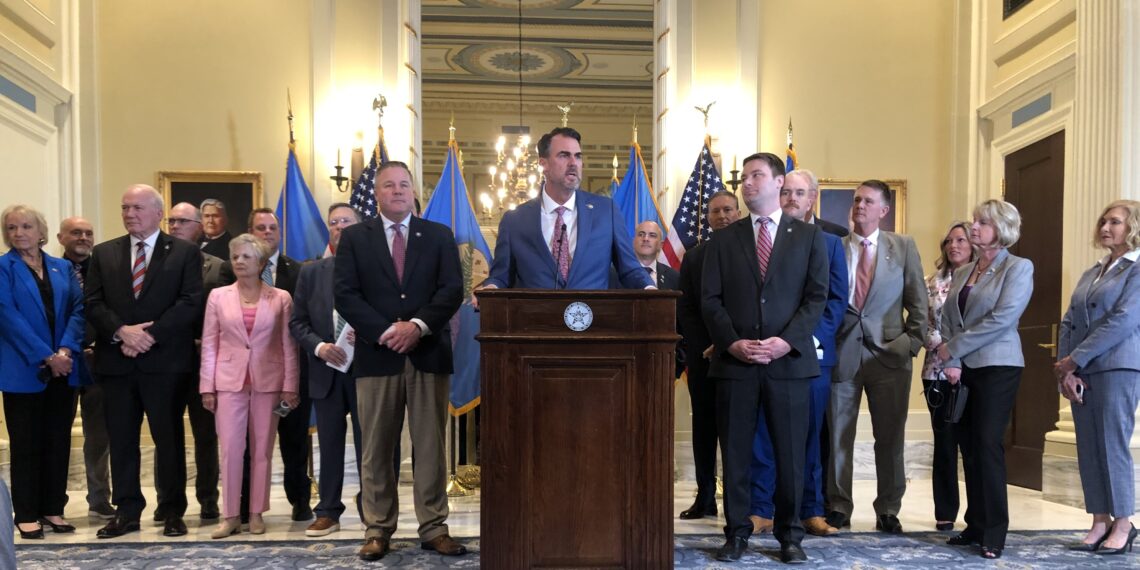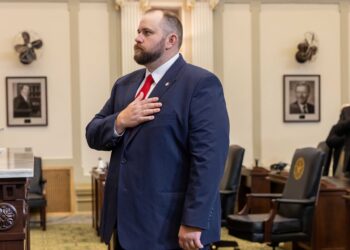OKLAHOMA CITY (OBV) – Caps on lawsuit payouts, greater transparency on who backs those lawsuits and protection against undue workers’ compensation claim liability — all prominent aspects of Gov. Kevin Stitt’s budget plan — are now state law.
Stitt announced his budget on May 14. The three tort reform initiatives within the plan are expected to significantly change how the judicial process resolves lawsuits against businesses.
“It’s been a longstanding priority of mine also to focus on tort reform. There’s some great bills that are going to be coming across the finish line here on workers’ comp and tort reform,” Stitt promised during a news conference announcing his budget, which also includes an income tax cut and the creation of business courts.
The three legs of tort reform are as follows:
- Senate Bill 453, written by Sen. Brent Howard, R-Altus, and Rep. Erick Harris, R-Edmond, places caps on the amount of money a plaintiff can be awarded for noneconomic damages. It also includes provisions governing expert testimony.
- Senate Bill 642, written by Senate President Pro Tempore Lonnie Paxton, R-Tuttle, and House Speaker Kyle Hilbert, R-Bristow, protects businesses and their contractors from undue liability on workers’ compensation claims by safeguarding the role of private contracts between businesses, contractors and subcontractors.
- House Bill 2619, written by Harris and Howard, requires that the identity of any third-party entity funding a lawsuit in Oklahoma be disclosed. It also requires that the party bringing a lawsuit provide a sworn affidavit stating whether a foreign state or an entity working on behalf of a foreign state is funding the lawsuit.
Stitt signed all three bills into law.
Chad Warmington, President and CEO of The State Chamber, said it was a great legislative session for Oklahoma business, with many wins capped off by tort reform.
“We executed perfectly on what we always try to do. We try to lead with great policy that develops great legislation. That is exactly what happened this year, and there is no better example than what we did on tort reform,” Warmington said. “We did a tort reform study earlier in the year and really looked at the cost of not having tort reform in Oklahoma. Not have a cap on noneconomic damages was crushing Oklahoma businesses, and we took care of that. The legislature did a great job and the governor signed it. It’s a perfect example of how our work at the Chamber is supposed to work — great research, great policy begets great legislation and now a good law that’s going to help Oklahoma businesses.”
The State Chamber of Oklahoma championed all three tort reform bills, strongly advocating for them at the State Capitol.
“We accomplished several things of real significance for the business community as it relates to the civil legal system, first and foremost reinstating the cap on noneconomic damages, which our Supreme Court threw out in 2019, in what was somewhat of a bizarre ruling after the law had been in place for about a decade. The legislature stepped up this year and reinstated that cap, and that will provide a lot of certainty for businesses moving forward,” said Adam Maxey, The State Chamber’s Vice President of Government Affairs.
The governor touted the tort reform package as protecting doctors and small businesses from frivolous lawsuits and egregious noneconomic damage awards.
“It’s going to keep more doctors in rural Oklahoma. It’s going to attract more health care professionals to our state,” Stitt said. “It’s going to make it easier for our medical community to take care of Oklahomans and ensure that there’s not some of these crazy, out-of-control verdicts.”
Stitt said the business-friendly budget is the product of he, Paxton, and Hilbert working together.
“Ronald Reagan used to talk about not getting everything he wanted, and if you could get 80 percent of what you want then it’s a good deal. This is not a governor’s budget, it’s not a House budget, it’s not a Senate budget, but it is the best budget that we could put together to make Oklahoma a top 10 state and the most business-friendly state and take care of some priorities that are really important to Oklahomans,” Stitt said.
Tort reform is key among those business-friendly priorities, according to Paxton, who, along with Hilbert, also spoke during the budget announcement.
“Tort reform has been one of my priorities since I arrived here at the Capitol. This year, we were able to deliver on that. That is a huge deal for the state of Oklahoma, and if you don’t know what we’re talking about, go deal with businesses that deal in this environment. It is a huge win for the state,” Paxton said.
Businesses have a keen interest in the civil litigation system, especially businesses that are looking to expand into a new state, according to David Meyerson, Senior Director of Legislative and International Affairs for the U.S. Chamber of Commerce.
“As businesses look to where they want to invest in building a new office and invest in expanding existing office, and trying to target new consumers, one of the things that is top of the list of priorities they’re analyzing is what is that legal climate? What will their potential exposure for non-meritorious litigation look like,” Meyerson said.
Leaders in the Oklahoma Legislature were emphatic about getting tort reform — which had been worked on for years — to the governor’s desk this year, according to Paxton.
“This year we worked very hard to get that final version,” Paxton said. “We are doing our best to become a very, very business-friendly state. That does not mean that businesses are not liable for torts that they create or cause.”
The tort reform measures outlined within the budget plan are a big win for growing business in Oklahoma, Meyerson said.
“I think the steps that Gov. Stitt and the legislative leadership took this week and have been working on for months now are a huge step in the right direction to ensure that businesses that are existing or looking to enter the state of Oklahoma have the certainty they need to thrive, to grow and to expand further in the state,” Meyerson said.
Noneconomic damage caps
SB 453 sets the award cap for noneconomic losses for bodily injury claims at $500,000. It also sets a $1 million award cap for permanent mental injury that prevents the plaintiff from being employed or enjoying a reasonable standard of living at $1 million cap. The bill states there will be no cap for permanent and severe personal bodily injuries.
Harris said SB 453 safeguards against unjustly high damage awards.
“At the end of the day, tort reform is not about ensuring that people aren’t able to recover funds or money from damages or incidents. The issue is how much and what is reasonable,” Harris said.
Some injuries do not merit massive financial awards from businesses that are found responsible for the injury, Harris said.
“For example, an individual slips on some water in a gas station and has to go to the doctor a couple of times but is otherwise living a relatively normal life. Is it fair that that individual is trying to get several million dollars for that little slip? How many times do we slip and fall in our own homes? How many times do we have those incidents at our house or with our friends? Does that mean that you’re entitled to several million dollars because of that? No,” he said. “But if you do have an incident where an individual has been damaged, especially severely, and they’re having life-altering treatments, then their medical damages should be paid for. Their real medical damage – not something that people just come up with to try and increase that number.”
It comes down to how much of an award is fair, Harris said.
“And that’s usually the issue, ‘how much?’ Some folks will go to experts who will say, ‘Oh, they need this, and they need that.’ And then you go to someone else who says, ‘No, they’re just inflating their costs.’ And that’s the issue,” Harris said. “If every company acknowledged [responsibility] to cover costs when someone has been [adversely] impacted by them, you wouldn’t have any lawsuits. But at the same time, if some litigants that bring these lawsuits realize, ‘Hey, I can’t use this for a get-rich-quick scheme,’ then we wouldn’t be seeing some lawsuits and we wouldn’t be seeing high requests for damages where the facts of that case don’t support.”
More than 30 states have caps on noneconomic damage awards, Maxey said.
“People paint it as extreme, but it’s a law we had on the books for 10 years. It’s a law in other states across the country. And the $500,000 cap, that subjective portion of damages is a fair amount that could be levied on top of economic damages or anything else awarded by the court,” he said.
The cap brings greater balance to the courts, according to Maxey.
“After the removal of the cap in 2019, we saw several nuclear verdicts in excess of $10 million, with large contributors being noneconomic damages. Reinstating the cap provides balance and is a great way to make sure that our civil justice system serves its purpose to make sure those who were wronged whole and not to incentivize frivolous lawsuits or jackpot justice,” he said.
SB 453 also puts standards for expert testimony into Oklahoma law. The standard is referred to as the Daubert standard in federal court. The Daubert standard’s intention is to ensure that expert witness testimony is reliable and a proven application of science.
“Putting that in statute here in Oklahoma is a big deal for us and for business to ensure that junk science stays out of our courts and that expert testimony, when given, is reliable and based in sound science and can be used properly,” Maxey said.
Employer liability
SB 642 is the Oklahoma Legislature’s response to the Oklahoma Supreme Court’s Knox v. Oklahoma Gas and Electric Co. ruling, which pertains to employer liability in workers’ compensation cases. The court’s ruling removed a business’ ability to contractually allocate risk between itself and its contractors.
The bill addresses the issue by reinstating indemnity agreements commonly used between businesses and their contractors, allowing for private contracts to serve as governing documents. It also provides an avenue for businesses to cover the workers’ compensation insurance for their contractors and subcontractors should they agree to do that on a job-to-job basis, which puts those employees on the same footing as W-2 employees of the other two businesses.
Dana Weber, chairwoman of The State Chamber of Oklahoma and CEO of Webco Industries, said SB 642 minimizes the amount of time and the amount of money that both the claimants and the defendants have to spend in court, and achieves a satisfactory resolution quickly and more cost effectively.
“We have a lot of contractors in many of our industries, especially in our energy industry, but in many industries. They were subjecting businesses to double liability. That is exactly what this bill was designed to prevent,” Weber said. “The Knox legislation fixes that issue and returns us back to what the legislature’s original intent was with the original workman’s comp reform.”
SB 642 does not adversely impact employees, Weber said.
“One of the most important aspects of that is it doesn’t take away anything from the employees. It really just makes it a more seamless process that the employees get taken care of and the businesses get taken care of,” she said. “The legal community doesn’t have as much income from these cases, but that’s okay, let them work on something else first.”
SB 453 and SB 642 will make a meaningful difference in keeping businesses in Oklahoma.
“We don’t need to have it where it’s a bunch of trial lawyers chasing those businesses around, suing them,” Paxton said. “This puts a cap on that. It makes it where injured workers still get benefits that they’re owed, but not [egregious] awards that make our businesses go do business somewhere else.”
Third-party entity funding
HB 2619 makes the tort process more transparent by exposing commercial third parties who fund litigation.
“It allows transparency in the process. It also allows for the disclosure specifically of the funding agreement,” Harris said.
The aspect of the bill that requires exposure of any foreign entity supporting a bill is necessary because that foreign entity’s intention might be to harm the United States or U.S. businesses, Harris said.
“Let’s just look at China, for example. China has run rampant in our state, purchasing land through individuals, shell companies and the like. And they’re going out trying to purchase our land. They’re heavily investing in medical marijuana. They’re heavily investing in illegal marijuana use in this state. This is all a part of, unfortunately, the Chinese’s goal to disrupt and confuse here in our country,” Harris said.
HB 2619 addresses non-meritorious litigation, which has been harming business since the 1990s, Meyerson said.
“I would say the biggest thing driving that is this newfound phenomenon known as third-party litigation funding, which this [tort reform] package very helpfully addresses,” Meyerson said. “[Third-party litigation funding] has poured truly billions of dollars into the American legal system, including in Oklahoma, making settlements more difficult, making the ability for average Oklahomans to get their day in court more difficult and raising real national security concerns.”
Maxey added that it better protects the civil legal system from being exploited.
“Business knows what they’re up against when they go to court. As we’ve said all session, our courts are not casinos, and they need to remain open and not clogged up by frivolous lawsuits that those type of arrangements can tend to facilitate when you have outside interests looking to make a return on investment in the courtroom, which could dissuade settlements or pervert the use and intent of our civil justice system,” Maxey said. “Making sure those are discoverable and disclosed in the course of legal proceedings is a huge win for the business community so that they know what they’re up against in court.”
Meyerson said the tort reforms will turn Oklahoma into a more viable destination for companies looking to expand.
“I think Gov. Stitt and the legislative leaders that worked on this deserve a tremendous amount of credit,” Meyerson said. “We are deeply grateful for their focus on this, as the U.S. Chamber, the national business community’s voice, and certainly of the Oklahoma State Chamber’s desire to push these reforms forward. There is no doubt these [reforms] will make Oklahoma a much more desirable place for businesses to invest and expand.”

















